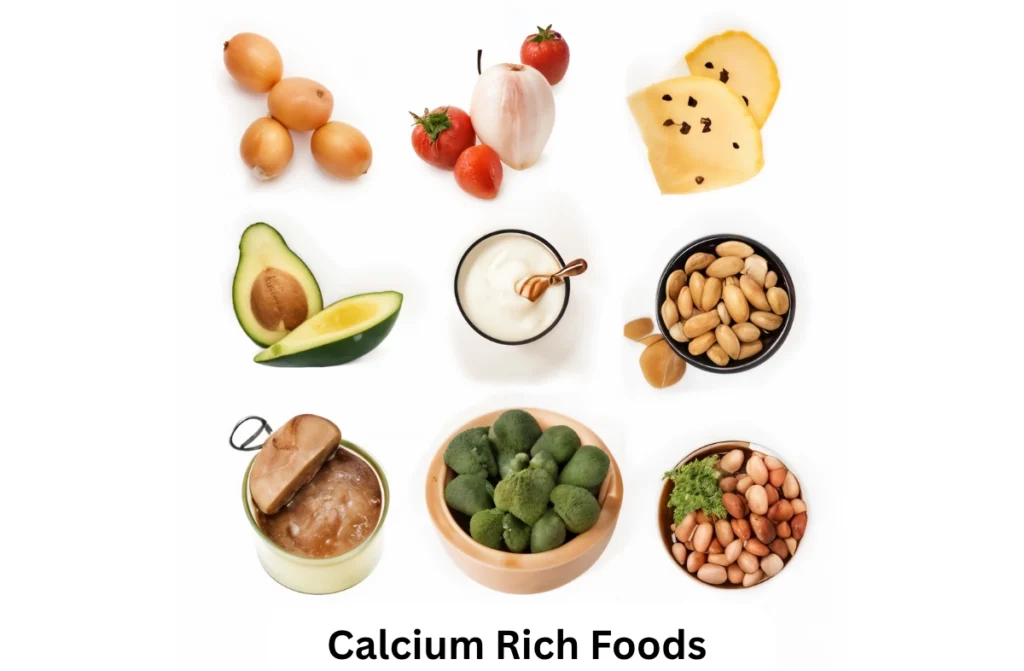When it comes to building strong and healthy bones, calcium plays an essential role. At Sunway Medical Center, we understand the importance of maintaining your bone health and are here to guide you through the journey. This blog will cover everything you need to know about rich foods for bones out calcium rich foods for bones, how calcium supports your body, and the best ways to incorporate it into your diet.
What is Calcium?
Calcium is a vital mineral that your body needs to function properly. It’s crucial for developing strong bones and teeth, supporting muscle function, and maintaining proper nerve signaling. Around 99% of your body’s calcium is stored in your bones and teeth, making it an integral part of your skeletal system.
Without enough calcium, your body can’t perform at its best, leaving your bones fragile and at risk of fractures. Incorporating calcium rich foods for bones is the first step to ensuring lifelong bone health.

Top 10 Calcium-Rich Foods You Should Include in Your Diet
A calcium-rich diet for osteoporosis and bone health is essential for maintaining bone density, preventing fractures, and ensuring overall skeletal strength. Below is a list of the best calcium foods for bones, beneficial for people of all age groups, especially those at risk for osteoporosis. These foods support a high calcium diet for osteoporosis and include calcium-rich foods for bones vegetarian options as well.
Milk
Milk continues to be a foundational element in a calcium-rich diet for osteoporosis due to its excellent calcium bioavailability.
- One cup of whole milk offers about 300 mg of calcium along with protein, potassium, and phosphorus — all crucial for bone development.
- It is especially effective when paired with weight-bearing exercise and vitamin D intake for optimal calcium absorption.
Yogurt
Among calcium rich foods for bones, yogurt holds a special place due to its probiotic content and versatility.
- Regular consumption supports gut health, which in turn may enhance nutrient absorption, including calcium.
- Greek yogurt, while slightly lower in calcium, is higher in protein — a vital macronutrient for muscle mass that supports skeletal structure.
Cheese
Aged and hard cheeses are concentrated forms of calcium and are considered one of the best calcium foods for bones.
- Cheddar and Swiss provide around 200–250 mg of calcium per 30g slice.
- While cheese is nutrient-dense, it should be consumed in moderation due to saturated fat and sodium content.
Fortified Plant-Based Milk
An ideal alternative for those who are lactose-intolerant or vegan, fortified plant-based milks can be considered calcium-rich foods for bones vegetarian.
- Fortified soy milk not only matches the calcium levels of dairy milk but also provides protein and isoflavones, which may support bone density.
- Rice and almond milk, though naturally low in protein, are commonly fortified to support a high calcium diet for osteoporosis.
Leafy Green Vegetables
Dark leafy greens are often overlooked but are an essential part of a calcium rich diet for osteoporosis, especially for vegetarians.
- Kale and turnip greens are low in oxalates, making their calcium more absorbable than that in spinach.
- Pairing greens with a vitamin C-rich food, like lemon or tomato, may further enhance calcium absorption.
Canned Fish with Edible Bones
Canned sardines and salmon are unique because their soft, edible bones provide one of the most bioavailable calcium sources.
- Just two sardines can offer over 90 mg of calcium, making them a compact source of bone-strengthening nutrients.
- These fish also provide vitamin D and omega-3 fatty acids — both of which aid calcium metabolism and reduce inflammation in bone tissue.
Calcium-Set Tofu
Among the calcium-rich foods for bones vegetarian, tofu is particularly beneficial when set with calcium salts like calcium sulfate.
- It’s not only high in calcium (up to 861 mg per half cup depending on brand) but also rich in iron and magnesium.
- Tofu’s adaptability allows it to be used in curries, stir-fries, and smoothies, supporting consistent intake.
Almonds
Though not as high in calcium per gram as dairy, almonds are still a valuable addition to a high calcium diet for osteoporosis.
- They also contain magnesium, which works synergistically with calcium to maintain healthy bone structure.
- A small handful daily can contribute to your calcium goals and deliver antioxidants and healthy fats.
Fortified Breakfast Cereals
These cereals offer a convenient and efficient way to boost calcium intake, particularly when consumed with fortified milk.
- Some fortified cereals provide up to 1000 mg per serving, making them one of the best sources of calcium for bones when included in breakfast.
- Be mindful of added sugars; opt for low-sugar options to maintain overall health.
Sesame Seeds and Tahini
Tiny but mighty, sesame seeds are often underrated as calcium-rich foods for bones vegetarian.
- They’re easy to incorporate into salads, sauces, or dips like hummus, supporting a nutrient-dense vegetarian diet.
- One tablespoon of sesame seeds provides 88 mg of calcium, while a tablespoon of tahini contains about 65 mg.
Role of Calcium in the Body
Calcium does more than just support your bones. It’s involved in:
- Muscle Function: Calcium helps muscles contract and relax properly.
- Blood Clotting: It’s essential for proper clotting and healing of wounds.
- Nerve Transmission: Calcium helps in transmitting signals between nerves.
When you include calcium rich foods for bones in your diet, it not only boosts bone density but also enhances overall bodily functions. Foods like dairy products, leafy greens, and fortified cereals are excellent sources of calcium and play a vital role in maintaining optimal health.
Calcium and Dairy Food
Dairy products are often the first thing that comes to mind when we think of calcium. Foods like milk, cheese, and yogurt are among the best calcium rich foods for bones because they provide calcium in a form that’s easy to absorb. One glass of milk can offer up to 300 mg of calcium, which is a significant contribution toward your daily requirement.
For those who are lactose intolerant, plant-based alternatives such as almond or soy milk, fortified with calcium, are excellent calcium rich foods for bones and provide a great substitute without compromising on your nutritional needs.
Too Little Calcium Can Weaken Bones
When your diet lacks calcium, your body starts taking calcium from your bones to perform essential functions. This can lead to weakened bones, increasing the risk of osteoporosis, a condition that causes brittle bones. By focusing on a high calcium diet for osteoporosis, you can reduce these risks and maintain bone density.
Calcium Needs Vary Throughout Life
Your calcium requirements change as you age. Here’s a breakdown:
- Children and Teens: Growing bones need more calcium, around 1,300 mg per day.
- Adults: Most adults require about 1,000 mg daily.
- Post-Menopausal Women: Women over 50 need 1,200 mg due to a higher risk of bone loss.
- Older Adults: Seniors also require around 1,200 mg to maintain bone health.
Eating calcium rich foods for bones and considering supplements, if needed, can help meet these requirements.
Foods to Eat for People with Osteoporosis
For individuals with osteoporosis, focusing on a calcium rich diet for osteoporosis is essential. Here are some recommended foods:
- Dairy Products: Choose low-fat or fat-free options for added calcium without extra calories.
- Fatty Fish: Sardines and salmon provide both calcium and vitamin D.
- Leafy Greens: These are nutrient-dense and support bone health.
- Fortified Foods: Opt for calcium-fortified juices and cereals to meet your daily needs.
These foods work together to provide a balanced high calcium diet for osteoporosis that strengthens bones.
Foods to Avoid for People with Osteoporosis
Certain foods can interfere with calcium absorption or contribute to bone loss. Avoid:
- Salty Foods: Excess salt can cause calcium loss through urine.
- Caffeine: High amounts of caffeine may hinder calcium absorption.
- Sugary Drinks: These can deplete calcium levels over time.
Steering clear of these foods ensures your calcium rich diet for osteoporosis is effective.
People with Special Calcium Needs
Some groups require extra attention to calcium intake:
- Pregnant and Breastfeeding Women: Higher calcium intake supports both the mother and the baby.
- Post-Menopausal Women: Hormonal changes increase calcium needs.
- Individuals with Health Conditions: People with lactose intolerance or kidney issues may need tailored diets or supplements.
For these individuals, finding the best source of calcium for bones is crucial to meet their specific needs.
Calcium Health Benefits
The benefits of calcium extend far beyond bone health:
- Prevents Osteoporosis: A calcium rich diet for osteoporosis can significantly reduce the risk of fractures.
- Supports Dental Health: Calcium strengthens teeth and prevents decay.
- Reduces Risk of Hypertension: Adequate calcium levels help maintain healthy blood pressure.
By consuming the best calcium foods for bones, you also support other critical functions in the body.
Calcium Supplements
Calcium supplements play a vital role in maintaining strong bones, especially for individuals who do not get enough calcium from their diet. While consuming calcium-rich foods for bones is the best way to meet daily calcium needs, supplements can help bridge the gap for those at risk of deficiencies.
Benefits of Calcium Supplements:
- Helps in maintaining bone density and reducing the risk of fractures
- Supports muscle function and nerve transmission
- Aids in preventing osteoporosis, especially in older adults
- Beneficial for individuals with lactose intolerance or dairy allergies
Types of Calcium Supplements:
- Calcium carbonate – Requires stomach acid for absorption, best taken with meals
- Calcium citrate – Easily absorbed and suitable for those with low stomach acid
- Calcium lactate & calcium gluconate – Less commonly used but effective
Before taking supplements, consulting a healthcare professional is crucial to avoid excessive calcium intake. Along with supplements, incorporating calcium-rich foods for bones ensures optimal bone health.
Calcium Risks
While calcium is essential for bone strength, excessive intake can lead to potential health risks. Relying solely on supplements instead of calcium-rich foods for bones may result in imbalances that affect overall health.
Potential Risks of Excess Calcium:
- Kidney stones health – High calcium levels can contribute to stone formation
- Heart issues – Some studies suggest excess calcium may lead to arterial stiffness
- Digestive problems – Too much calcium can cause bloating, constipation, or gas
- Interference with nutrient absorption – Excessive calcium may reduce the absorption of iron, zinc, and magnesium
How to Balance Calcium Intake:
- Prioritize calcium-rich foods for bones such as dairy, leafy greens, and nuts
- Maintain a balanced intake with vitamin D to enhance calcium absorption
- Follow recommended daily allowances (1000–1200 mg for most adults)
By consuming the right amount of calcium through diet and supplements, individuals can maintain healthy bones while minimizing potential risks.
Conclusion
Maintaining strong and healthy bones is essential for a long and active life. By focusing on a calcium rich diet for osteoporosis and including the best source of calcium rich foods for bones, and regular exercises you can significantly reduce the risk of bone-related issues. At Sunway Medical Center, we are here to guide you in making the best dietary and lifestyle choices for your bone health.




